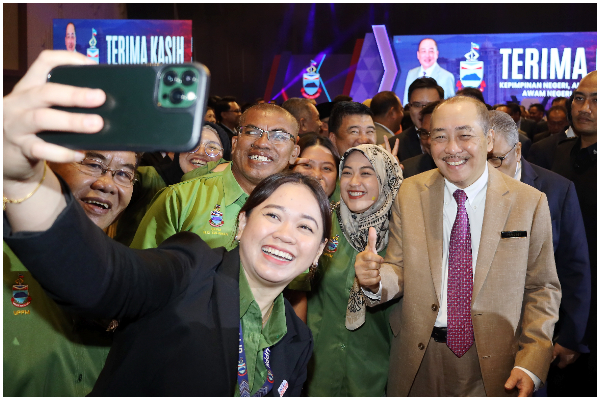Finally, something even better than State Assembly protection
Published on: Sunday, September 24, 2017
(First of a series)
THE Ramsar status – because of its global recognition as the wetlands equivalent of a World Heritage Site – offers something which even State Assemblies and Parliaments cannot guarantee, i.e an additional layer protection against greedy developers who may have other plans for the site or its vicinity in the future. In fact, the benefits are manifold, says Sabah Wetlands Conservation Society (SWCS), Datuk Hj Zainie Abdul Aucasa.
ADVERTISEMENT
"Once you are accorded that type of recognition, you are in a different league altogether. It means your wetlands centre is internationally recognised as a wetlands of international importance. Hence, there will be greater attention accorded to it in terms of research and conservation."Secondly, it signifies a new layer of wetlands protection. At the same time, like in some other countries, it will further boost its reputation as a tourism attraction," he said.
ADVERTISEMENT
The SWCS President since March 2008 said it is looking forward to more opportunities for funding on research and development, and that the Ramsar site status will enhance the conservation value of the site.Though dependent very much on tourism for income, Hj Zainie is mindful of the fact that KK Wetlands is very much a conservation area but which practises "economic wise use of this place, given its tourism potential".
ADVERTISEMENT
"That is why we have 24 hectares here but within which, there are certain areas that are not open to the public. These are meant solely for research purposes unlike some other wetlands which even have restaurants to generate income. "We don't although we believe the wetlands must be visited by people," he stressed.He said SWCS is banking on the observance of significant days like World Wetlands Day and World Environment Day to earn some revenue for management of the wetlands. Two years ago, the Society organised a 2-km Walk & Plantathon, starting from the main entrance and going one round towards the nursery before planting mangrove saplings. Participation fee was RM50 per person."Having said that, we are mindful of the need to strike a balance between drawing tourists and visitors, and maintaining the wetlands as a recognised research centre," he said.As KK Wetlands is being promoted as a conservation area, it has not come to a situation where they have to limit the number of visitors and tourists.Hj Zainie said two years ago, a Sabah Datuk and a group of businessmen from China approached him in the hope of extending the SWCS Office premises and building a bus terminal as well as a 24-hour restaurant. "Apparently, the KK Wetlands was the group's first choice and they have been studying the area for a few months. Their plan was to get tourists from all over China to come, and they would extend the bus arrival time. "They were prepared to spend millions and we could secure millions, too, so they told me."They said Datuk, you can get money from this project. You don't have to scratch your head thinking of how to make money, begging here and there.' "But I said, 'I am very sorry. Who doesn't want money, it will save us (SWCS) a lot of 'headache'. But ours is a conservation area for staggered tourists. We can't put up a restaurant.' No, no, no. We can't for the sake of conservation although we are struggling to get funding," he said he told them.The Ramsar status, more than anything, also means Sabah is again recognised as a State that is already deeply involved in conservation. "Our Chief Minister Tan Sri Datuk Seri Musa Aman is always campaigning for conservation. He has given a lot of attention to conservation. The fact that he personally attended the handing-over of the Ramsar site certificate speaks volumes of his concern. I was pleasantly surprised." Since the wetlands dedication, new species of mangroves have been found. These include Brugueira gymnorhiza, Ceriops zippeliana and Acrostichum speciosum."Prof Dr Jean W.H. Yong (Singapore University of Technology and Design), urged us to increase the species of mangroves during the 2016 International Symposium on Conservation and Management of Wetlands (ISCMW) held in Kota Kinabalu. He said our area is suitable for increasing the number of mangrove species. We are doing that…in fact, we now have one of the endangered mangrove species, Brugueira hainesii (taken from one of the Tunku Abdul Rahman islands a 15-minute boat ride off the State Capital). In the world, there are only about 200 mangrove trees of such species left.""There is a committee to try and identify other species of mangroves found in other places for the purpose of planting them here (KK Wetlands). I was told that in Malaysia, there are over 50 species of mangroves (a combination of pure and associates). Of the figure, 32 mangrove species (or more than half) have been recorded at the KK Wetlands."Despite the recurrent threats of El Nino, no serious drought has been encountered at the KK Wetlands since inception. Rainwater is harvested for use during the dry spell.Hj Zainie said there is always the risk of losing the Ramsar status in future as has happened in China and India.This is exactly what he wished to avoid when approached with a business proposal by joint investors from China. When a destination secures Ramsar site status, it becomes well-known and those who run the place may entertain business proposals in the hope of reaping profits. People may come with attractive offers or promises of sustainable development."But how do you control the busloads of tourists coming by the hundreds every day? As a result, the reality is that the place may not be properly maintained, there is littering and noise pollution, and what have you.Having obtained the status, officials from the Ramsar world body will carry out regular inspections. "If we at KK Wetlands fail to meet the requirements, for example, losing the endangered bird species (because they are frightened away by large crowds of visitors), then we are likely to lose the status," he warned.As at December 2016, SWCS had a total membership of 150, including eight Life Members and 18 Corporate Members.The Rotary Club of Kota Kinabalu (RCKK) has been involved with KK Wetlands as far back as 1999 when Tengku Adlin was the Club President. That was three years after the wetlands was designated by the State Cabinet as the Kota Kinabalu City Bird Sanctuary. By virtue of his position as Community Service Director, Zainie was assigned to the wetlands for one year and he was answerable to Adlin who requested him to stay on for another year after his (Zainie's) term was over.Stay up-to-date by following Daily Express’s Telegram channel.
Daily Express Malaysia









